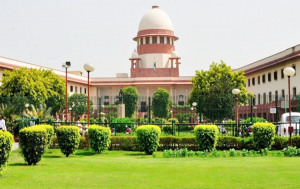
Indian National Congress (INC) leader Dr. Jaya Thakur moved the Supreme Court on Monday seeking implementation of the recently passed Women’s Reservation Bill before the general elections in 2024 and without waiting for the conduct of fresh delimitation exercise [Dr Jaya Thakur vs Union of India and Ors.].
The Bill was passed by Lok Sabha on September 20 and by the Rajya Sabha on September 21 before it received the President’s assent on September 28.
The Bill added Article 334A to the Constitution of India. This new Article states that reservation for women in Lok Sabha and State legislative assemblies will come into effect only after a delimitation exercise is carried out. This process will take place after the results of the first census conducted after the amendment are made public.
Dr. Thakur’s plea, however, calls for women’s reservations to be carried out without waiting to complete such a delimitation exercise.
To this end, the plea seeks the declaration of the words “after an exercise of delimitation is undertaken for this purpose after the relevant figures for the first census” in Article 334A as void ab initio.
According to the petition, a Constitutional amendment cannot be stayed for an uncertain period.
The plea added that there is always a presumption regarding the constitutional validity of an enactment. As such, unless the amendment and enactment are declared ultra vires of the Constitution, their effect and operation cannot be stayed, Dr. Thakur submitted.
To support this argument, the plea cited the apex court’s decisions in the cases of Bhavesh D Parish and Ors vs Union Of India and Anr, Desiya Murpokku Dravida Kazhagam vs Election Commission Of India and Health For Millions Trust vs Union Of India
The census, which is usually conducted once every 10 years, was earlier scheduled for 2021. However, it was delayed by the COVID-19 pandemic and is now expected to take place in 2024.
Earlier, during discussions in the Lok Sabha, Congress parliamentary party Chairperson Sonia Gandhi had expressed the Congress’ support for the Bill but questioned why it was contingent on the conduct of the census and delimitation exercise.
She further emphasized the need for a caste census to ensure reservation for women belonging to the Scheduled Castes, Scheduled Tribes as well as other backward classes.
“Congress supports the Women’s Reservation Bill. We are happy with it. There is one concern as well. I want to ask a question. For 13 years, women have been waiting for their political responsibilities. Now, they are being told to wait longer. How many years? 2? 4? 8? Is this behaviour appropriate? We ask that this bill be passed soon but caste census also be conducted to provide for reservation to SC, ST and OBC women. The Government must take steps to make this happen,” she said.
The following day, in the Rajya Sabha, Bharatiya Janata Party (BJP) President JP Nadda stated the exercises of census and delimitation were necessary to decide which seats were to be reserved for women.
“There’s a way to work Constitutionally. After all, we have to give women reservation. But who will decide which seats are to be and not to be reserved? Government can’t do it. A quasi judicial body does it. It has to be nominated. If I’m in the government and reserve Wayanad? What if I reserve Amethi? What is I reserve Rae Bareli, Kalaburagi? Two things are essential. First, census. Then a public hearing through the quasi-judicial authority, determining seats to be reserved,” he said.